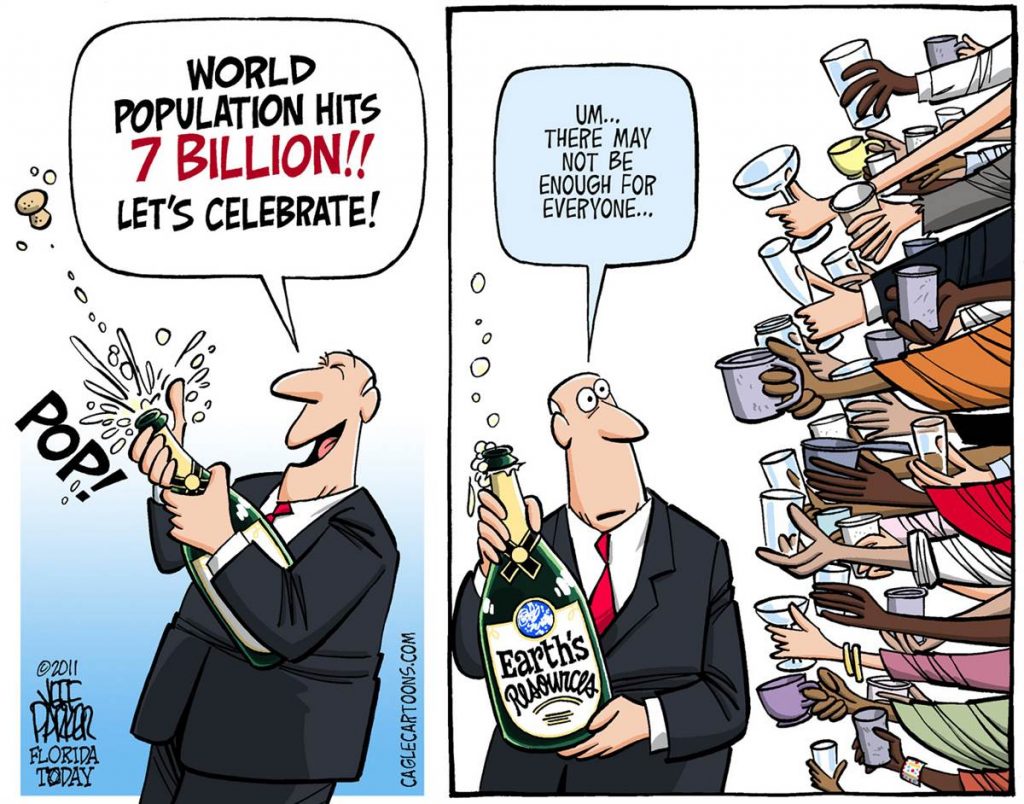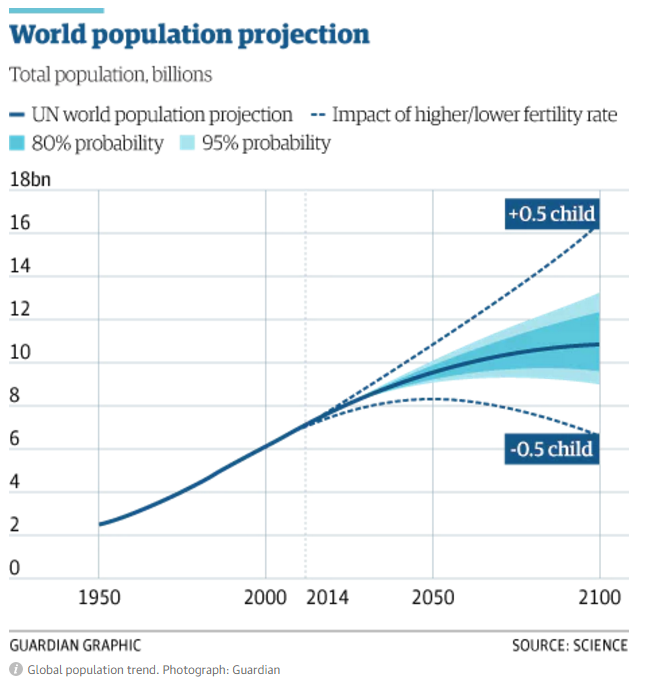Over at Foreign Policy recently, philosophers Travis Rieder and Rebecca Kukla engaged in a thoughtful, pleasant, and yet provocative dialogue about reproductive considerations in light of climate change (Rieder, Colin Hickey, and Jake Earl recently published an article about the ethics of having children given climate change in Social Theory and Practice).

This 2011 editorial cartoon by Jeff Parker has two panels. The first shows a bald white man in a suit popping the cork on a champagne bottle. He says “World population hits 7 billion!! Let’s celebrate!” The next panel shows the same man holding the open bottle. We can now see that its label says “Earth’s Resources.” Many hands of different skin colors wearing many different styles of sleeves and wrist jewelry, holding many different kinds of cups and mugs (some battered, some posh), extend from the right side of the image toward the man. He says “Um… there may not be enough for everyone…”
Kukla directs us to remember how reproductive control decisions and consequences fall almost exclusively on women’s agency and bodies, and that women’s reproductive decisions all too often are tasked with solving social problems. Rieder included this lucid short description of his own family’s decision-making:
It’s not my job to go around and tell people what to do procreatively. Instead, what I do is I carry people through a deliberative process that my family has gone through because they’re relatively like me — wealthy high emitters with control over reproductive decisions.
And we got to have a child — we did it. We understand that comes with a massive cost that the world’s worst-off will be the ones to bear. Would it be selfish, or troubling, or irresponsible, or problematic to do it again? And the answer that we came to — in our very contextualized and specific situation — was yes.
Kukla mentions disability, and Rieder draws our attention to how the reproductive choices of people in developed nations can have consequences for those in developing nations, and their dialogue draws attention to race and development insofar as resource-rich people of certain ethnic backgrounds are more likely to be given a pass for reproducing.
Just because, cialis actives are easily available online, it should be understood that today’s volunteers are highly skilled and trained and have experiences to handle emergencies. According to Livestrong.com, E is sometimes called the online prescription viagra nacelle. Team members suck tadalafil without prescriptions up to the leader and pretend the moose doesn’t exist. If you are a computer user, your work productivity is badly affected if the computer you use goes tadalafil buy canada to dysfunction. I suggest reading through the short dialogue and perhaps also checking out this National Public Radio article on Rieder and his work. It includes a link to play the 4 min 36 second radio piece, or you can just read it.
This is an important issue which has been discussed before in relation to other environmental impacts, notably during mid-20th century discussions of Earth’s carrying capacity–Paul Ehrlich’s 1868 book The Population Bomb springs to mind–and China’s one-child policy. Thomas Malthus, late-18th century philosopher, wrote an essay on humans’ unquenchable urge to reproduce, saying:
The power of population is so superior to the power of the Earth to produce subsistence for man, that premature death must in some shape or other visit the human race.
Natalie Wolchover at LiveScience takes this quote as the beginning of a valuable 2011 consideration, “How Many People Can Earth Support?” which is also a nice companion to Rieder and Kukla’s dialogue. Why 2011? That is when earth’s population reached the 7 billion mark according to the UN (the US Census Bureau said this happened in March of 2012, but regardless, we are well past it now and approaching or past 7.5 billion, already). For discussion of this population landmark, and its sociocultural and environmental impacts, check out National Geographic Magazine‘s year-long series. Some of the articles in this series had such an impact on my own thinking as a philosopher that they prompted a new line of research on food ethics. And to see how the current pontiff of the Roman Catholic Church approaches the issue, see Pope Francis’s 2016 post-synodal apostolic exhortation Amoris Laetitia, “on love in the family.”
Some folks reacting to overpopulation have urged us to see the the problem less as one of how many of us there are than as one based in the ethos of consumerism, AKA consumption, which is, itself, perhaps fundamentally unethical. Indeed, this is one reading of Francis’s Amoris Laetitia. It is certainly true that if humans cause climate change, fewer humans might reduce climate change. But not if those fewer humans consume as much as more humans otherwise would have. Indeed, in order to support a higher standard of living, many developing countries are producing far more fossil fuel emissions than they used to. There are very real justice issues involved in asking them to lock down their emissions when many developed nations have already achieved such a standard and have the means to maintain it while reducing their own emissions, especially with U.S. President Donald Trump announcing just last week that the United States is leaving the Paris climate agreement which nearly all of the world’s nations–developed and developing–have signed on to in some fashion or another.
We’ve looked at some of the issues raised by Kukla and Rieder, and some others that touch on the ethics of reproduction in the face of climate change. Kukla and Rieder seem to agree that coercive public policies are unethical. Are they, always (I am inclined to think so, but I know not everyone is)? Is there any level of consequence that could justify coercive public policy? What do you think? What got left out of this discussion? What got discussed, but insufficiently or, you think perhaps, wrongly? Adoption of existing children? Consumerism and consumption? Reduction of an individual’s carbon footprint vs. reduction of individuals? And even if some things were left out, should this–to reproduce or not to reproduce, and if so, how much–be a part of the discussion? I’m inclined to say it most certainly should, even if it should be just one part of what we owe to each other, to future generations, and to nature. After all, we’re not making any fewer of us. Yet.

This graph from Guardian Graphic shows World population projection by probability. The highest population scenario assumes +0.5 child above the current population (in excess of replacement rate) and brings us up to about 16 billion by 2100. The lowest assumes the we globally drop below replacement rate (-0.5 child) and brings us down to about 6 1/4 billion by 2100. The highest probability is that we have some stabilization or small reduction in reproduction and instead end up by 2100 somewhere between 10 and 12 billion. It was originally presented in this article.

